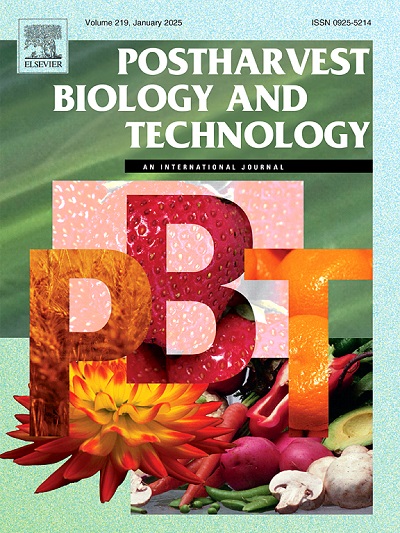Dynamic finite element simulation of the collision behavior and multi-parameter quantitative characterization of the damage degree of banana fruit in the post-harvest operations
IF 6.4
1区 农林科学
Q1 AGRONOMY
引用次数: 0
Abstract
Squeezing, collision, friction and other behaviors are widely present in the post-harvest processing operations of bananas, such as field picking, de-handing, cleaning, packaging and transportation, which will inevitably cause a certain degree of mechanical damage to banana fruits. In view of the difficulty in accurately detecting and quantifying fruit damage in the early stage of production, this paper adopted dynamic finite element numerical simulation and multi-parameter optimization of response surface to carry out simulation analysis on the collision behavior of banana fruit in the post-harvest operations, and the accurate assessment and quantitative characterization of fruit damage degree and erosion rule were carried out. The three-dimensional solid model of banana was established by reverse engineering method based on 3D scanning technology. The multi-scale finite element model of banana was further established by combining the constitutive parameters of banana bunch obtained from quasi-static mechanical experiments. In this study, a total of 27 collision systems including different contact materials, collision angles and impact speeds were developed to quantitatively characterize the changing rules of contact force, equivalent stress, energy, damage volume and bruise susceptibility of fruit under different experimental scenarios. An empirical prediction model for banana fruit’s bruise susceptibility was established using response surface optimization methodology, and the comprehensive effects of contact material, collision angle and impact speed on fruit damage were obtained. On this basis, three dynamic collision systems including banana hand and impact panel were developed, and the generation region and erosion rule of equivalent stress of banana hand and impact panel under different encounter postures were further investigated. Finally, the physical verification experiments of banana impact and collision were carried out based on the characteristics of banana growth distribution and movement in the actual post-harvest operations. The experimental results showed that the prediction models of bruising susceptibility of banana fruit under different scenarios achieved a prediction accuracy of more than 80 %. The residual stress inside the banana hand under Posture_3 is the smallest (2.55e-2 MPa), and the maximum relative error between the predicted value and the experimental value of bruising susceptibility is less than 8.5 %. These results indicate that the multi-scale dynamic finite element model and the empirical prediction model of collision system for bananas are reasonable and correct, and the study have certain reference value for the numerical simulation and quantitative characterization of damage degree of other fruits and vegetables.
香蕉果实采后加工过程中碰撞行为的动态有限元模拟及损伤程度的多参数定量分析
挤压、碰撞、摩擦等行为广泛存在于香蕉采后的田间采摘、去杂、清洗、包装、运输等加工作业中,不可避免地会对香蕉果实造成一定程度的机械损伤。鉴于生产初期果实损伤难以准确检测和定量,本文采用动态有限元数值模拟和响应面多参数优化方法,对香蕉果实在采后作业中的碰撞行为进行了仿真分析,对果实损伤程度和侵蚀规律进行了准确评估和定量表征。基于三维扫描技术,采用逆向工程方法建立了香蕉的三维实体模型。结合准静力学实验所获得的香蕉果串构成参数,进一步建立了香蕉的多尺度有限元模型。本研究共建立了 27 个碰撞系统,包括不同的接触材料、碰撞角度和碰撞速度,以定量表征不同实验场景下水果的接触力、等效应力、能量、损伤体积和挫伤敏感性的变化规律。利用响应面优化方法建立了香蕉果实挫伤敏感性的经验预测模型,并得出了接触材料、碰撞角度和冲击速度对果实损伤的综合影响。在此基础上,建立了包括香蕉手和冲击板在内的三个动态碰撞系统,并进一步研究了香蕉手和冲击板在不同相遇姿态下等效应力的产生区域和侵蚀规律。最后,根据实际收获后作业中香蕉生长分布和运动的特点,进行了香蕉冲击和碰撞的物理验证实验。实验结果表明,不同情况下香蕉果实挫伤敏感性预测模型的预测准确率达到 80% 以上。其中,Posture_3 条件下香蕉手掌内部的残余应力最小(2.55e-2 MPa),淤伤敏感性预测值与实验值之间的最大相对误差小于 8.5%。这些结果表明,香蕉碰撞系统的多尺度动态有限元模型和经验预测模型是合理和正确的,该研究对其他果蔬损伤程度的数值模拟和定量表征具有一定的参考价值。
本文章由计算机程序翻译,如有差异,请以英文原文为准。
求助全文
约1分钟内获得全文
求助全文
来源期刊

Postharvest Biology and Technology
农林科学-农艺学
CiteScore
12.00
自引率
11.40%
发文量
309
审稿时长
38 days
期刊介绍:
The journal is devoted exclusively to the publication of original papers, review articles and frontiers articles on biological and technological postharvest research. This includes the areas of postharvest storage, treatments and underpinning mechanisms, quality evaluation, packaging, handling and distribution of fresh horticultural crops including fruit, vegetables, flowers and nuts, but excluding grains, seeds and forages.
Papers reporting novel insights from fundamental and interdisciplinary research will be particularly encouraged. These disciplines include systems biology, bioinformatics, entomology, plant physiology, plant pathology, (bio)chemistry, engineering, modelling, and technologies for nondestructive testing.
Manuscripts on fresh food crops that will be further processed after postharvest storage, or on food processes beyond refrigeration, packaging and minimal processing will not be considered.
 求助内容:
求助内容: 应助结果提醒方式:
应助结果提醒方式:


